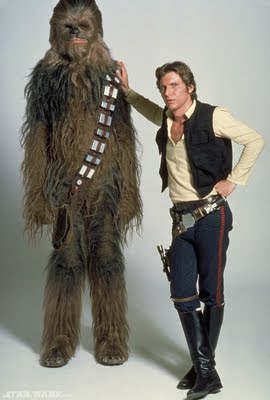Here’s the next post in this series where I discuss TV shows and movies and the knowledge that we can gain from watching them. We can apply that knowledge to our writing. As always, I never pretend to be an expert. I just like exploring my own thoughts on the matter as I write these blog posts! I welcome all comments and would love to hear what you think about this topic.
Make sure you check out my previous post, titled, “How to shock the socks off your readers, with Colby Granger from Numb3rs.”
 Hopefully you guys have read my thoughts on Star Wars as someone who has just recently watched the original trilogy for the first time. It’s pretty relevant, because we’re going to be talking about Chewbacca today!
Hopefully you guys have read my thoughts on Star Wars as someone who has just recently watched the original trilogy for the first time. It’s pretty relevant, because we’re going to be talking about Chewbacca today!
Chewy was one of my favorite characters in the films, which is interesting because, well, he doesn’t really talk. I mean, he does speak, but not in a language we can understand.
I thought this was an interesting character trait, and something that would be quite difficult to accomplish in a novel. If your character can’t talk, how can you give them a personality? How can you tell your readers exactly what they’re thinking (assuming the POV isn’t theirs)?
The easy answer to this is to “show, don’t tell.” We’ve heard it a million times, and I think it applies here more than anywhere else. If your character can’t — or won’t — speak, the best way to show your readers exactly the type of person they are is through body language.
You should already be doing this with your other characters, but it’s doubly important if a character has no dialogue.
In the movies, Chewy’s movements were paramount to understanding him. While you could make a distinction between when he was happy or when he was upset by the sounds he made, it was much clearer when that was backed up with physical actions. Whether he was hitting someone or hugging them, it made it so much easier to understand his emotions.
A character in your book that doesn’t speak needs to do the same things. They need to interact with other people in order to show those characters what they’re thinking. A hand firmly planted on a hip versus a hand fingering the fraying hem of a shirt speak volumes of two different emotional states.
While dialogue is an important facet to your novel, so is physical action. Even more so when your character won’t be speaking at all. That physical action in place of dialogue is the literal answer to showing and not telling. A character that doesn’t speak would create a challenge for an author, I think, but one that’s definitely worth pursuing.
Do you know any characters in a book that don’t speak? How did the author get around them not being able to communicate verbally? Do you have any characters that don’t speak in your work? What’s your favorite scene starring Chewbacca? 🙂








